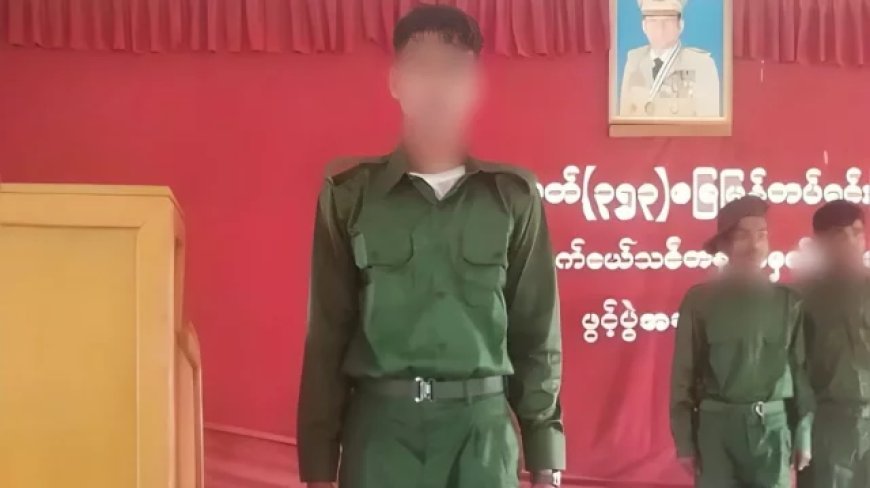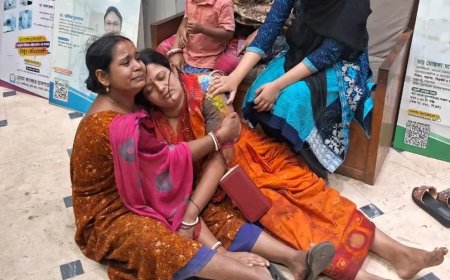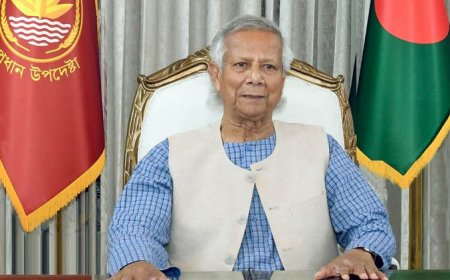The Struggles of a Rohingya Youth Under Myanmar's Military
In 2024, the conflict in Myanmar's Rakhine State saw a significant intensification.

Abul Kalam, a young Rohingya man, has shared the harrowing details of his forced recruitment into Myanmar's military. His testimony provides a rare insight into the brutal tactics employed by the junta, the persistent discrimination faced by Rohingya recruits, and the devastating effects of the ongoing conflict on his family and community.
A Community Caught in Conflict
The year 2024 saw a dramatic intensification of conflict in Myanmar's Rakhine State. Violent clashes between the Myanmar military and the Arakan Army (AA), an ethnic group representing the Rakhine people, turned the region into a war zone. The AA’s substantial territorial advances near the Bangladesh border forced the Myanmar military into a defensive position, resulting in constant airstrikes and ground assaults. These attacks have left many civilians dead and displaced tens of thousands. In this chaos, the Rohingya community has suffered doubly, trapped in the crossfire and exploited by all sides. Thousands of Rohingya men and boys, including Kalam, were conscripted through threats, coercion, and false promises of citizenship. Meanwhile, Rohingya armed groups have recruited from refugee camps in Bangladesh, smuggling recruits back into Rakhine to fight against the AA alongside the military. This web of forced recruitment has endangered countless lives and deepened the rift between the Rohingya and other ethnic groups, especially the Rakhine.
Kalam’s story exposes the harsh realities faced by forcibly conscripted Rohingya soldiers, often referred to as the “Rohingya Military,” and the personal toll of the conflict on his life.
A Family Torn Apart
Kalam comes from a farming family in Myanmar, where his father grew paddy, vegetables, and betel leaves to provide a modest living for their family of ten. However, their lives were shattered by the conflict.
“In June 2024, while we were eating together, a bomb hit my brother’s father-in-law’s house, where we had sought shelter from the fighting,” Kalam recalled. The explosion killed his mother and five other relatives, including his brother’s mother-in-law, two brothers-in-law, and his sister-in-law and her husband.
Six other family members, including Kalam’s father, youngest brother, and two nieces, were severely injured. “My father was hit by bomb fragments, my youngest brother injured his leg, and one of my nieces lost a finger,” he said.
Coercion and Broken Promises
Kalam’s forced recruitment into the Myanmar military began with threats. “They told us, ‘If you don’t join, we will burn your houses, abduct your brothers, and kill your parents,’” he recalled. Kalam was taken on March 13th and remained with the military for over three months.
The junta promised recruits citizenship and better prospects, but these promises were never fulfilled. “No progress was made toward citizenship,” Kalam explained. “They just recorded our village names and education levels, offering us false hope.” A total of 41 young men were recruited from his village under similar circumstances, leaving families devastated and the community torn apart. The promises of citizenship, freedom of movement, and military promotions were empty.
Life as a Rohingya Soldier
During his time with the military, Kalam participated in three battles, including one in his own village, Moricha Bil. “We were poorly trained, with only two weeks of basic weapons practice,” Kalam explained. “Myanmar soldiers receive six months of rigorous training, learning to assemble, disassemble, and operate various weapons,” he continued. “We barely learned how to disassemble rifles.”
“They didn’t recruit us to protect the country; they used us as human shields on the frontlines,” Kalam said. “Their goal was to sow hatred between the Mogh (Rakhine people) and us.”
The most painful part of his experience was being ordered to turn against people from neighboring communities. “We were instructed to seize goods from the Rakhine if they didn’t offer them willingly,” Kalam said. “If anyone didn’t have their ID cards, we had to arrest or stop them.” These orders fueled mistrust and animosity between the Rohingya and other ethnic groups, deepening divisions the military appeared intent on exploiting.
When asked about being used as human shields, Kalam explained, “During transfers, we had to act as shields. There were two military camps, one in our village and another in Moricha Bil. We were transferred weekly, with five soldiers in the middle and ten of us positioned in front and behind.” He further explained, “We could only shoot if they gave us permission.”
The discrimination Kalam faced as a Rohingya soldier was evident. “If Burmese soldiers were assigned one hour of guard duty, we had to do three,” he said. Rohingya recruits were also required to report every bullet fired, while their Burmese counterparts faced no such scrutiny. Their meals were also inferior, reflecting their second-class status in the military.
Kalam noted that injured Rohingya soldiers received minimal medical attention. “Those with severe injuries were sent to a small clinic and given basic medication,” he said. “Some died, others survived with limited care. If recovery wasn’t possible, they were left to suffer.”
Kalam’s time with the military was fraught with hardship and danger. When the Arakan Army began using drones, the military was forced to abandon the 353 Battalion headquarters and retreat. “The drones were computer-operated, making victory impossible,” he said. Amidst the chaos of the retreat, Kalam seized the chance to escape after three months and two days with the military. He and others sought refuge in the Naaraing mountains, where they endured harsh conditions for 41 days. “Some days we ate, other days we starved. We only ate if we could find food,” he recalled.
Dreams Interrupted
Before the war, Kalam was a student at Nachidauk High School and had completed Class 9. “My dream was to finish my education, start a business, and become a teacher,” he said. Those dreams were shattered by his forced conscription.
Kalam eventually fled to Bangladesh, with financial support from his brother. They coordinated through voice recordings sent via a WhatsApp group. “We crossed the border during Fajr prayers to avoid detection by the Bangladesh border guards,” he explained.
Kalam’s experience in the military exposed him to unimaginable horrors. “During battles, I saw people losing limbs, heads, and other body parts,” he said. “It was horrifying and has left me deeply traumatized.”
Kalam’s story is a heartbreaking reminder of the systemic exploitation faced by the Rohingya. His experience underscores the emotional and physical toll of forced recruitment and the broader oppression of the Rohingya community in Myanmar. “The world needs to know what’s happening to us,” Kalam said. “We are being used, abused, and forgotten.”
What's Your Reaction?




















































































